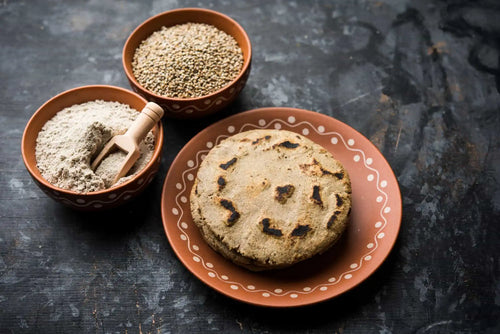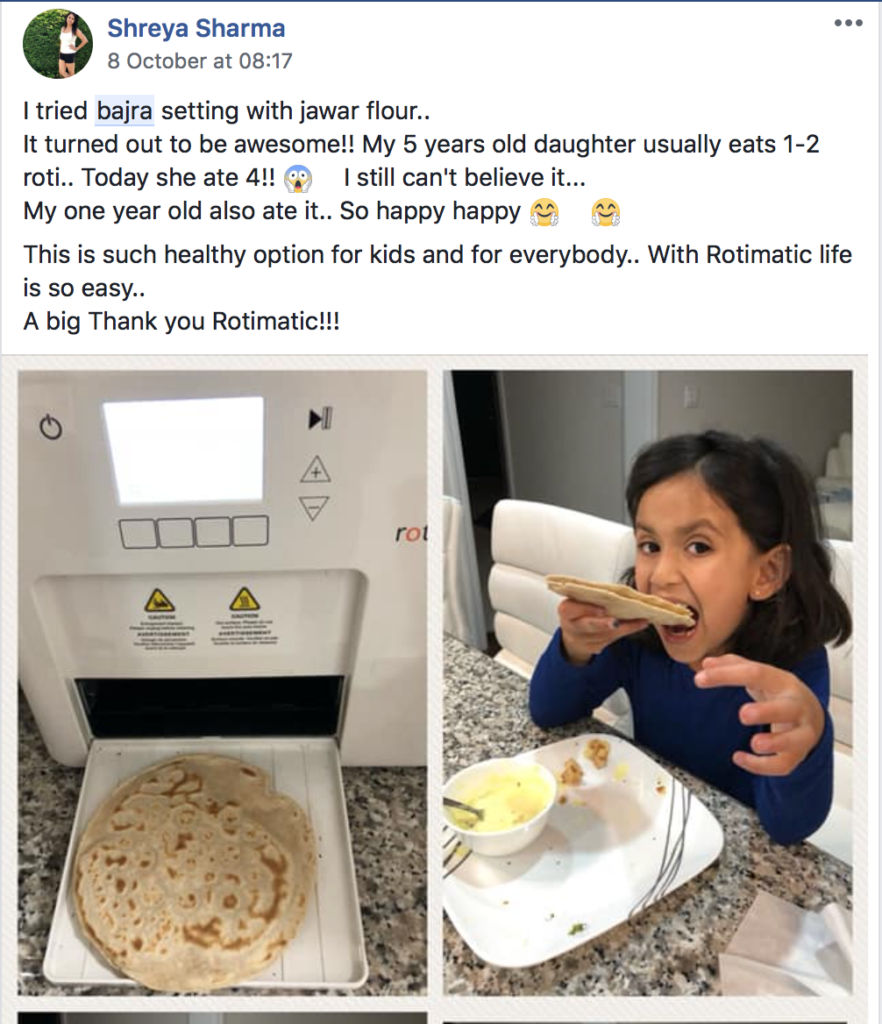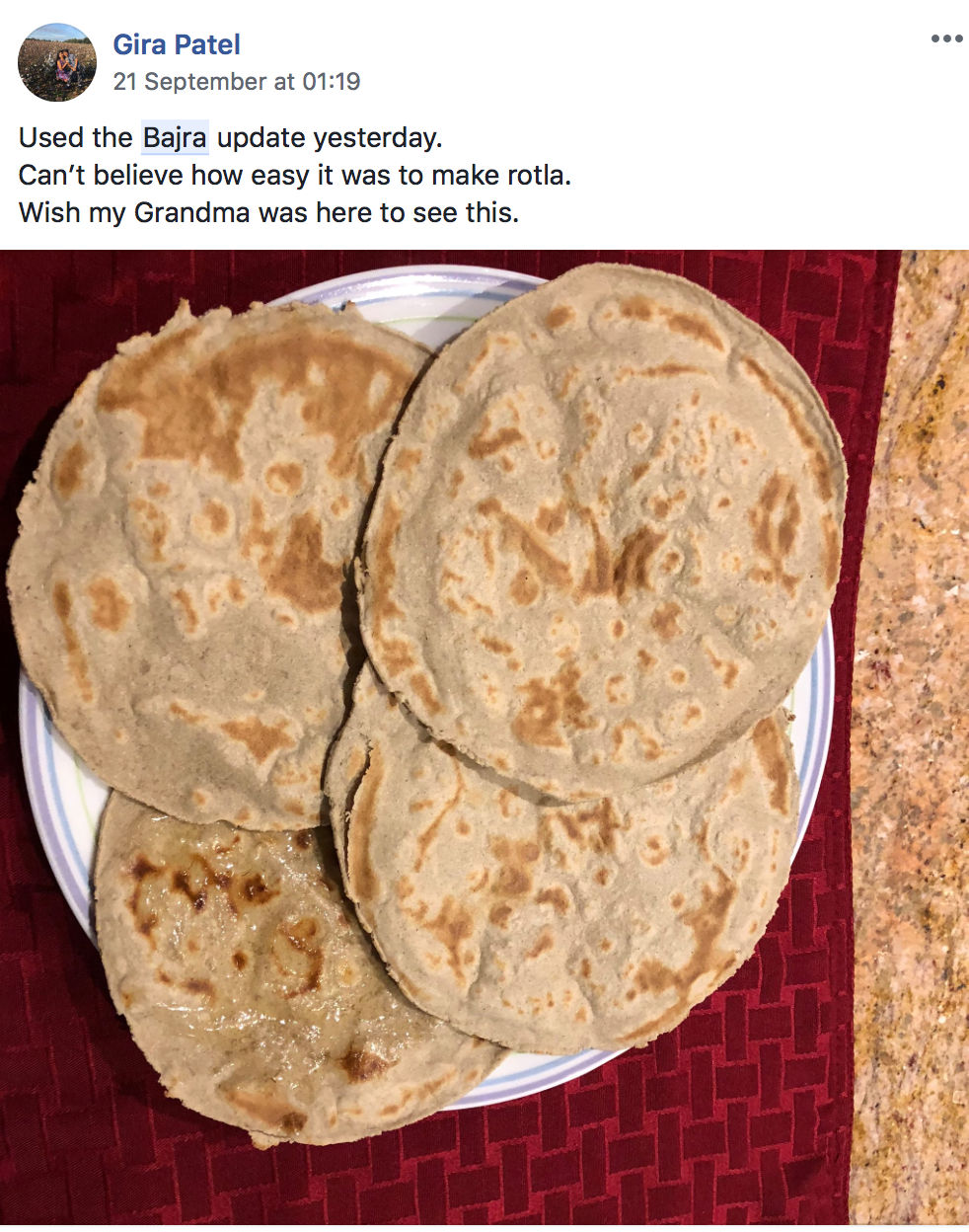A Guide to Bajra and Bajra Roti – The What, Why and How

Bajra, known by various names such as pearl millet, bulrush millet, or bajri, has graced Indian households for centuries. Among its many forms, bajra roti stands out as a beloved staple. Not only is this traditional unleavened flatbread utterly delicious but it's also packed with health benefits, making it a smart choice for the health-conscious.
What is Bajra Roti?
Bajra roti is an Indian flatbread (commonly known as roti) made from bajra flour, water, and sometimes a dash of salt. It's the go-to gluten-free alternative to wheat-based rotis, particularly cherished in regions like Rajasthan, Gujarat, and Haryana. With its rustic, earthy flavor and slightly coarse texture, bajra roti carves out its unique identity in the world of Indian breads.
Bajra Nutrition
As mentioned earlier, bajra is packed with health benefits and is a gluten-free alternative to wheat. Let’s take a look at what makes bajra a nutritional powerhouse.
-
Vitamins: Loaded with niacin (B3), thiamine (B1), riboflavin (B2), and folate (B9), bajra fuels metabolism and overall health.
-
Minerals: Essential minerals like magnesium, phosphorus, potassium, and iron are abundant in bajra. Magnesium supports muscles and nerves, while iron is vital for oxygen transport.
-
Protein: Bajra boasts a decent protein content, making it a valuable asset for vegetarians, aiding muscle and tissue repair.
- Fiber: Rich in dietary fiber, bajra roti aids digestion, keeps you feeling full, and assists in weight management and blood sugar control.
Bajra roti is also high in iron and zinc and has been speculated to be useful for anemics. Its anti-inflammatory properties are essential in the prevention of cardiovascular diseases. It also has a high amount of antioxidants and polyphenols, making it rich in anti-cancer properties! To top it off, its high fiber content makes it a great grain to battle constipation!
Bajra roti is the ideal carbohydrate to consume for the management of diabetes. It is not only rich in nutrients, but it has a low glycemic index (GI) too! Low-GI foods are foods that release energy slowly when digested. They protect your kidneys from over-exertion and reduce insulin spikes. Thus, bajra roti is an excellent option for those who are watching their sugar and weight!
How to Make Bajra Roti
Making bajra roti from scratch the traditional way is a methodical art of first making the dough by gradually adding a little water at a time for the right firmness. Next, the dough is divided into smaller balls, which are then flattened into thin rotis by pressing the dough ball between the palms of your hands and carefully maneuvering the wrists in a rhythmic motion, being careful not to tear the roti as it expands into a thin evenly flat disk.
All so complicated – yes, we know. But, there are adaptations to this art that you can follow to make great bajra rotis. Here's a traditional recipe with a slightly modern method:
Ingredients:
- Bajra flour (2 cups)
- Water (1 cup, approximately)
- Salt (a pinch, optional)
Instructions:
- In a mixing bowl, combine the bajra flour and, if you prefer, a pinch of salt.
- Gradually add water while kneading the flour into a smooth, pliable dough. It should be firm but not dry.
- Divide the dough into small, equal-sized portions and roll them into balls.
- Take a dough ball and flatten it between your palms to form a small disc.
- Using a rolling pin, roll out the disc into a round, thin roti, taking care not to tear it.
- Heat a griddle or tava over medium-high heat, place the rolled-out roti on it, and cook until it develops golden-brown spots. You can use a little ghee or oil for added flavor.
- Serve the piping hot bajra roti with your favorite vegetable curry or chutney.
Tips for Mastering the Art of Making Perfect Bajra Roti
Despite all the health benefits, many still find bajra roti taxing to make and cook! The whole preparation and cooking process takes 30–45 minutes for even the most experienced chefs. Flattening bajra can be a nightmare as it has very little gluten and will not clump and roll in the same way as wheat flour will. Wrestling the dough with your fingers in an attempt to flatten it will often lead to lumps. Using a rolling pin may prove to be a challenge as the dough tends to stick to it. The final product is hardly ever a perfect circle, and if flattened unevenly bajra roti will not cook uniformly!
Crafting bajra rotis by hand can be a bit tricky, as you now know, but with these tips, you'll master the art (with sufficient practice, of course):
1. Kneading Know-How:
Ensure your dough isn't too dry or too wet; find that perfect balance by adjusting the water gradually.
2. Rolling Finesse:
Gently roll out the rotis to prevent them from breaking; a sprinkle of dry bajra flour can help prevent sticking. Also, start with applying just a little pressure and then move your way up till you find the right balance.
3. Puffing Reality:
Unlike wheat rotis, bajra rotis don't puff up much – don't fret, they're still delicious! The key here is practice and patience.
4. Time and Effort:
Be mindful that making bajra rotis can be time-consuming, so plan accordingly, especially with busy schedules.
Bajra Roti Simplified with Rotimatic
Bajra roti is what our elders and their elders in India ate traditionally, and as we grow more aware and health conscious, we are realizing its great value and nutritional benefits. It certainly is a powerfood that we should pass on to our children and grandchildren by making it a part of our daily diets and family dinner time.
As a working professional who values a healthy lifestyle, you probably don’t have the time to make bajra rotis, and we get that. But if you want to incorporate them into your daily diet, then we have the perfect solution for you. Imagine having the perfect bajra roti made each time, and you do not have to make the dough, flatten it, or roll the roti, nor do you have to cook and puff it.
This is where the magic of Rotimatic, the world’s #1 robotic roti maker, comes into the picture. A nifty kitchen gadget that streamlines the process of crafting perfect rotis, even bajra rotis. The Rotimatic is a game-changer in the kitchen, automating the bajra roti-making process with the new “Bajra” setting. It combines kneading, rolling, and cooking into one seamless operation, saving time and effort.
How Rotimatic Simplifies the Process of Making Bajra Roti
Rotimatic’s new bajra setting solves all your bajra woes. With this update, each bajra roti will come out perfectly cooked and perfectly shaped! The best part is - you don’t even need to wait half an hour or so to make a roti. It only takes 90 seconds! Feed your family bajra roti anytime, at your convenience! It just takes the push of a button.
Perfect Dough Kneading:
The Rotimatic expertly kneads the dough, ensuring each roti has the ideal texture.
Uniformly Round and Cooked Rotis:
With precise rolling and cooking mechanisms, the Rotimatic delivers consistently round and perfectly cooked rotis every time.
Efficiency Personified:
Making rotis with the Rotimatic is remarkably efficient, allowing you to whip up a batch of rotis in mere minutes.
The Rotimatic Process to Make Bajra Roti
- Step 1 - Choose the flour of your choice - Bajra needs to be mixed with wheat flour to make bajra roti, so choose the brand of flour that you will be using.
- Step 2 - Select the “Bajra” setting - From the ‘recipe’ option in the menu, select it and then the ‘Flour’ option followed by ‘Bajra’ Menu - Recipe - Flour - Bajra
- Step 3 - Mix and add flour to the bowl provided - Mix one and three-fourths cups of bajra flour with one and one-fourth cups of compatible flour brand in a mixing bowl. Mix well and fill this mixture in the atta container. Replace the lid of the container and, put it back into its slot, click ok.
- Step 4 - Select roti quality and roast level - Select the number of rotis you want and the roast level.
- Step 5 - Press play – Enjoy perfectly round, evenly cooked, and healthy bajra rotis as part of your healthy meal.
Why Choose Rotimatic to Make Bajra Roti?
- Automated Process: Rotimatic makes roti-making accessible to even those with minimal cooking experience with a simplified, fool-proof process.
- Time-Saving: Ideal for busy individuals and families, the Rotimatic accelerates the process, freeing up time to enjoy family dinner time.
- Customization: The Rotimatic allows you to choose options that let you customize the thickness, roast level, and flour option.
- Consistency: With the Rotimatic, you can expect uniform and perfectly cooked rotis every time, elevating your dining experience.
- User-friendly Interface: The simplicity of the machine makes it super easy for anyone to use it, making the roti-making process
- Consistency: With the Rotimatic, you get uniform and perfectly cooked rotis every time, elevating your dining experience.
See Why Our Customers Love Using Rotimatic’s Bajra Setting


Click to order your Rotimatic here.
Benefits of Bajra Roti, Making it a Perfect Addition to a Healthy Diet
Bajra Roti offers not just taste but great health benefits, such as:
- Gluten-Free: Naturally gluten-free, bajra is a safe choice for those with gluten sensitivities or celiac disease.
- Low in Calories: Bajra roti trumps wheat-based bread in calorie content, making it a smarter option for calorie-conscious eaters.
- High Fiber: Packed with dietary fiber, it aids digestion, regulates blood sugar, and keeps you full – an ally in weight management.
How Many Calories Does Bajra Roti Have
A single bajra roti typically contains around 90-100 calories which is lower than the calories of a whole wheat roti, making it a sensible choice for those monitoring calorie intake.
Modern Twists on Bajra Roti
While traditional bajra roti reigns supreme, here are some modern recipes to spice things up:
Leftover Bajra Roti Jaggery Coconut Churma
Crush leftover Bajra Rotis, mix them with jaggery and grated coconut, and shape them into sweet, bite-sized balls.

Wagharelo Rotla
A spicier version of Bajra Roti, incorporating ingredients like sesame seeds, red chili powder, and ghee.

Image Credit: www.gujrasoi.com
Bajra Roti Chivda
Cut leftover Bajra Rotis into small pieces, fry until crisp, and season with spices for a crunchy snack.
Image Credit: www.betterbutter.in
Bajra vs. Other Grains (Alternate: Comparing Bajra With Other Grains)
Bajra vs. Wheat
Bajra and wheat serve distinct purposes. Bajra is gluten-free, ideal for gluten-sensitive individuals, while wheat provides gluten protein. Your selection hinges on your dietary requirements and taste preferences.
Bajra vs. Jowar
Both jowar (sorghum) and bajra are nutritional powerhouses. Jowar edges ahead in protein and fiber, while bajra boasts more iron and certain B vitamins. Your choice depends on your dietary needs and preferences.
Storing Bajra Flour and Bajra Rotis
To maintain the freshness and nutritional value of your bajra roti:
- Store bajra flour in an airtight container in a cool, dry place.
- Refrigerate cooked bajra rotis in an airtight container to prevent them from drying out.
Other Rotis to Explore
If Roti is something you enjoy, we encourage you to go through some other Roti variations that you might also enjoy:
The perfect bajra roti is just a click of a button away – order your Rotimatic TODAY!

Bajra roti, a nutritious and versatile flatbread, holds its own in the rich variety of Indian cuisine. Whether you embrace the traditional, handcrafted method or opt for the convenience of a modern marvel like the Rotimatic, bajra roti deserves a place at your table. Its gluten-free nature, high fiber content, and rich nutrient profile make it a valuable choice for those seeking healthier alternatives. So, when you're craving a delicious and nutritious bread option, consider the timeless option of bajra roti.
FAQs
1. What to serve with bajra roti?
Bajra Roti, a wholesome Indian flatbread, pairs wonderfully with various Indian dishes. It complements vegetable curries, lentil soups (dals), chutneys, and tangy pickles.
2. How to store bajra roti?
For storing cooked bajra roti, ensure it is snugly sealed in an airtight container and placed in the refrigerator. You can keep it fresh for up to two days.
3. Is bajra gluten-free?
Yes, bajra is naturally gluten-free. This makes it a safe choice for individuals with gluten sensitivities, offering a delicious alternative to wheat-based foods.
4. Can diabetic individuals enjoy bajra roti?
Certainly! Bajra Roti is a favorable option for people with diabetes. It boasts a low glycemic index and is rich in fiber. However, as with any food, portion control is crucial to managing blood sugar levels effectively.
5. Is bajra roti suitable during pregnancy?
Absolutely. Bajra roti can be included in the diet during pregnancy. It delivers essential nutrients like folate and iron, which are especially beneficial during this period. Nonetheless, it's wise to consult a healthcare provider for personalized dietary recommendations during pregnancy.
6. Can bajra roti be consumed in hot summers?
Yes, indeed. Bajra roti is a nutritious and filling choice that can help sustain energy levels even in scorching summer weather. Its versatility makes it a suitable option year-round.
7. Is it advisable to consume bajra roti daily?
Including bajra roti as part of your regular diet can be a healthy choice. However, as with all foods, moderation is key. A balanced diet with a variety of grains and nutrients ensures optimal nutrition.
8. How to reheat bajra roti?
To reheat bajra roti, lightly moisten it with water and warm it on a griddle or tava (pan) until it regains warmth and pliability. This keeps it tasting just as delightful as when freshly made. Alternatively, you can also heat it in the microwave for 10-20 seconds, covered with a moist paper towel.
9. Is bajra roti superior to wheat roti?
The preference between bajra roti and wheat-based roti depends on individual dietary preferences and nutritional requirements. Bajra roti stands out for being gluten-free and high in fiber, making it an excellent choice for those avoiding gluten. On the other hand, wheat roti provides gluten protein. Both can be part of a healthy diet when consumed sensibly, catering to diverse dietary needs.